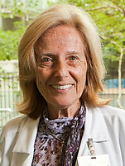Optimization of conditions for ex vivo expansion of CD34(+) cells from patients with stage IV breast cancer Journal Article
| Authors: | Shapiro, F.; Yao, T. J.; Raptis, G.; Reich, L.; Norton, L.; Moore, M. A. S. |
| Article Title: | Optimization of conditions for ex vivo expansion of CD34(+) cells from patients with stage IV breast cancer |
| Abstract: | Multiple cycles of high-dose chemotherapy can be hematologically supported by repeated administration of peripheral blood progenitors obtained after mobilization using cytokine alone or in combination with chemotherapy. We have explored the quality of such cells and their potential to undergo ex vivo expansion. Twenty-five leukapheresis samples from 19 patients who had received extensive prior chemotherapy for stage IV breast cancer were subjected to CD34+ cell selection using immunoaffinity columns or immunomagnetic bead separation. Cells were cultured in suspension in the presence of c-kit ligand, interleukin-3, interleukin-6, erythropoietin, and granulocyte colony-stimulating factor. Ten experiments were performed using weekly exchange of media and cytokines (Delta assay). Median myeloid and erythroid progenitors expanded 15-fold at 7 days (range, 7 to 43), 40-fold at 14 days (range, 18 to 470), 46-fold at 21 days (range, 0 to 118), and 21- fold at 28 days (range, 0 to 61). In a system using gas-permeable bags without exchange of media or cytokine, median progenitors expanded 13-fold at 7 days (range, 7 to 36), 14-fold at 10 days (range, 4 to 61), 14-fold at 12 days (range, 3 to 46), and 10-fold at 14 days (range, 1 to 35). Progenitor expansion less than 10-fold occurred in 8% of experiments at day 7, in 17% at day 10, in 43% at day 12, and in 50% at day 14. When autologous plasma, autologous plasma processed (removal of cryoprecipitate, centrifugation, then filtration), or human serum were substituted for 20% fetal calf serum, the ratio of progenitor expansion at 7 days relative to 20% fetal calf serum for 10% human serum, 20% human serum, and 1% autologous plasma processed was 1.01 (range, 0.62 to 1.33), 0.88 (range, 0.61 to 1.20), and 0.96 (range, 0.55 to 1.64), respectively. These findings support the feasibility of ex vivo expansion in a system free of nonhuman proteins of CD34+-derived progenitors obtained from the peripheral blood of patients who have received prior chemotherapy. |
| Keywords: | cancer chemotherapy; clinical article; controlled study; human cell; doxorubicin; antineoplastic agents; cancer staging; neoplasm staging; antigen expression; animal; cells, cultured; cell division; cd34 antigen; stem cell factor; breast cancer; erythropoietin; erythroid precursor cell; cyclophosphamide; hematopoietic stem cell transplantation; breast neoplasms; thiotepa; cytokines; hematopoietic stem cells; interleukin 6; interleukin-6; antigens, cd; colony-forming units assay; granulocyte colony stimulating factor; granulocyte colony-stimulating factor; antigens, cd34; colony forming unit gm; leukapheresis; colony formation; fetal calf serum; interleukin 3; interleukin-3; burst forming unit e; human; priority journal; article; support, non-u.s. gov't; support, u.s. gov't, p.h.s.; hematopoietic cell growth factors; milodistim |
| Journal Title: | Blood |
| Volume: | 84 |
| Issue: | 10 |
| ISSN: | 0006-4971 |
| Publisher: | American Society of Hematology |
| Date Published: | 1994-11-15 |
| Start Page: | 3567 |
| End Page: | 3574 |
| Language: | English |
| PROVIDER: | scopus |
| PUBMED: | 7524742 |
| DOI: | 10.1182/blood.V84.10.3567.3567 |
| DOI/URL: | |
| Notes: | Export Date: 14 January 2019 -- Article -- Source: Scopus |
Altmetric
Citation Impact
BMJ Impact Analytics
Related MSK Work







